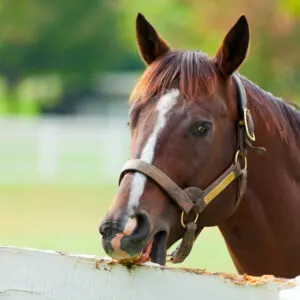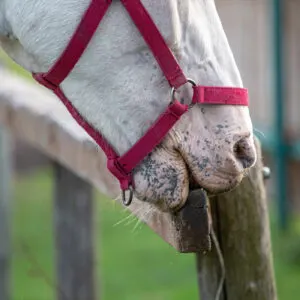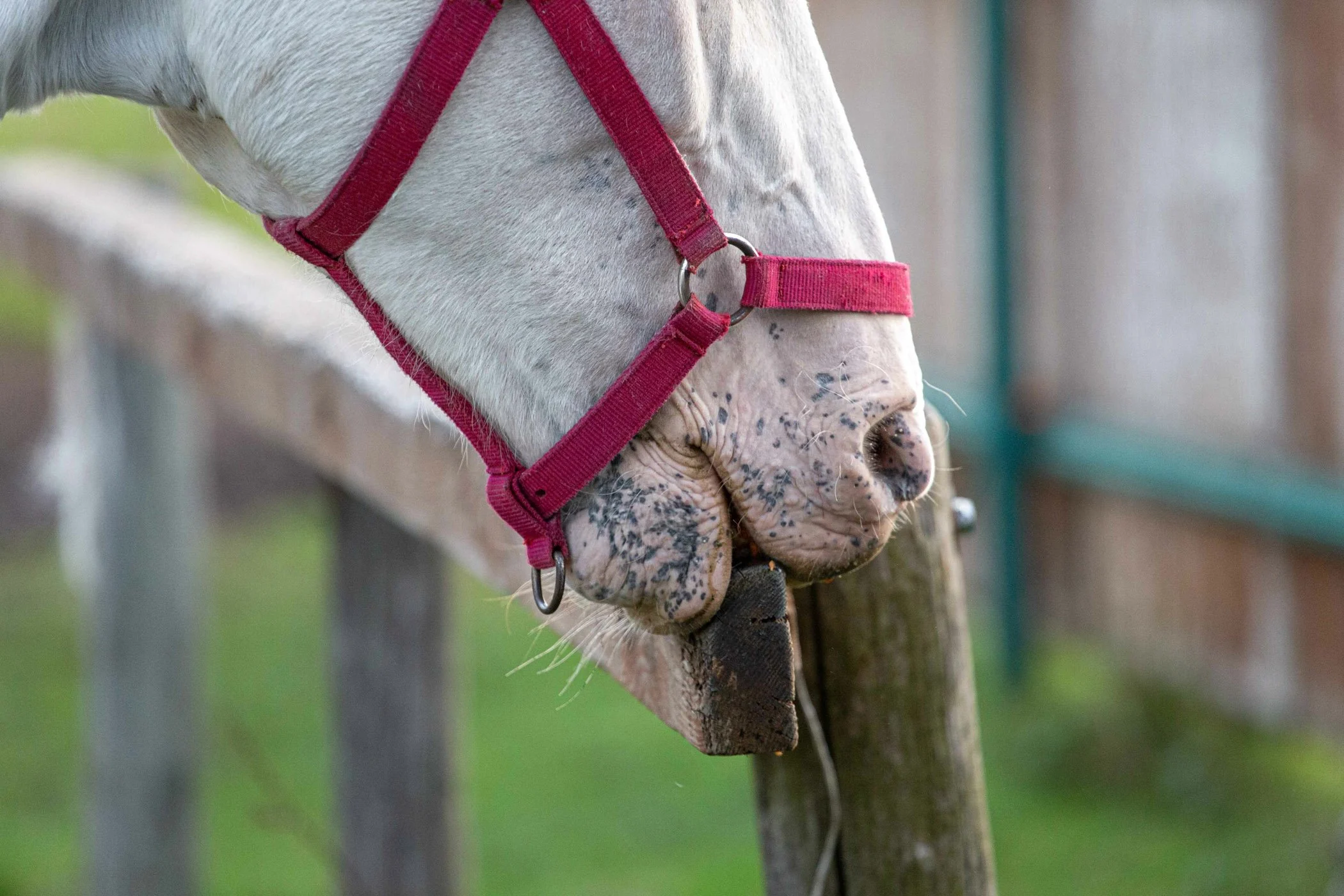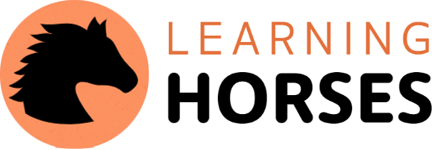Horses that chew on fences can be a real pain! Over time, their teeth marks left on notched boards become an eyesore. Beautiful fencing and new stall fronts can be ruined when your horse decides that the wood looks like a tasty snack. Luckily, there are several easy ways to get your horse to stop chewing on wood fence boards.
In this article, you’ll learn more about how to:
- Identify whether your horse is actually chewing on wood or cribbing. (Cribbing is a more complex bad habit for horses)
- Tips to figure out why your horse is chewing on fences.
- Plus 5 ways to discourage horses from chewing on wood fencing.
Horses that chew on wood can quickly turn a beautiful farm into an eyesore. Deal with the behavior using these tips.
How to Tell the Difference Between Chewing and Cribbing
Sometimes a horse chewing on wood is mistaken for cribbing. Cribbing involves a horse placing their teeth on a surface, but is more complex. When a horse cribs, they grasp a stationary object (such as a fence rail) with its teeth and then inhales air. As we talk about in our post about cribbing, researchers think it’s a way that stressed horses learn to soothe themselves.
Cribbing
looks like: horse rests teeth on a surface and inhales
leaves behind: teeth marks or scrapes on wood.
mouth is usually open with teeth often visible

wood chewing
looks like: horse actively knawing on wood
leaves behind: half-moon-shaped bites out of fencing.
mouth is often closed around the object

Cribbing horses can damage fencing (usually less than horses who actively chew) as they drag their teeth across the wood. Cribbing is a difficult habit to break in a horse, but a few treatment options help. These can include changing the type, quantity, and frequency of feeding, and making sure the horse gets plenty of exercise.
Tips to Figure out Why your Horse is Chewing Wood
Once you have determined that the horse is actually chewing, not cribbing, the next step is to try to figure out why. What is causing the horse to chew on the wood fencing. Asking these questions can help shed light on the cause:
- Is it something they have always done? Or is it a new habit?
- Do they only chew on wood when in a stall or also outdoors?
- Do they chew when turned out with companions or only when they are alone?
- Does the horse chew on wood fencing instead of eating nearby grass?
- How much time do they spend chewing each day? Do they prefer the behavior to food or companionship?
Some horses may try to reduce boredom by chewing on fences or stall doors. If your horse does not get a lot of exercises or mental stimulation, then this may be a reason. Another possibility is that they are lacking essential nutrients in their diet. Horses short on important nutrients may be trying to get those nutrients from other sources. Finally, horses may chew on wood in an attempt to soothe physical pain or psychological distress.

5 Ways to Stop Horses from Chewing on Wood Fencing
Horses are known to chew on wood, and this can be a problem for horse owners- especially if it happens regularly. If a horse chews on the wood fencing, it can damage the fence seriously. There are a few different ways to try to stop a horse from chewing on wood:
Check their feed’s nutrition
What a horse eats can affect a lot of aspects of their health, including their behaviors. If you suspect that your horse is chewing on wood because they may be lacking key nutrients in their diet, there are a few options to try to fix it.
The first option is to check the balance of nutrients in the hay and feed that your horse is eating. If any important minerals that are missing, then you will know what needs to be supplemented. This can be done by:
1. adding special supplements to the feed. Or
2. changing the feed completely, Many pelleted horse feeds offer balanced nutrition.
Always be sure that your horse has access to a salt block and a mineral block. These nutrients may help take their attention off of chewing on your fence and provide them with needed minerals.
Provide Them with Plenty of Access to Forage
Horses are built to graze throughout the day. If a horse does not have access to grass or hay in their pasture, they may turn to the fencing. Chewing wood may provide some sustenance to a very hungry horse, as well as relieve boredom.
Horses who live in a stall all the time are more likely to develop the habit of wood-chewing. This is because they do not have consistent access to grazing. These horses are more likely to become bored than horses who live outside.
Some horses may also like the taste or the texture of a particular type of wood. If this is the case, it may be worth trying to scatter some pieces of the same type of wood in their field to divert their focus from the fence.
Use Deterrents on the Fencing
Another option is to try different chew-deterrent fence treatments to discourage them from chewing on it. It may take some trial and error to see what the horse responds to best. Some people have had good luck with spreading hot sauce on things they don’t want their horses chewing on. There are some non-toxic sprays, such as Bitter Apple, and non-toxic soaps that can be sprayed on the fencing to stop them from chewing as well.
These deterrents include:
- commercial solutions like Bitter Apple
- hot sauce or cayenne pepper
- soap residue
(Beware, though, some horses seem to LIKE the flavor of certain deterrents, so it may take trial and error) They will also easily wash off in the rain. Because of this, they are a better option for dry climates and hot summers.
Keep chewing horses away from the fence using an electric wire
Wood pasture fencing isn’t the strongest, so many farm owners use a single strand of electric fence in combination with a wood fence. Special mounting brackets hold a line of electrified tape that runs along the top rail for the length of the fence.
After being jolted once by a live electric fence, most horses will know to stay far away from it.
While electric tape may harm the charming look of a plain wooden horse fence- it’s a better alternative to a chewed post and rail fence!
Place a Physical Barrier Along the Fenceline
Putting a physical barrier on a fence may also work. You can make a cover from a corrugated drainage pipe, or something similar.
It will not look very pretty to have a drainpipe all along the tops of your fencing; however, it will protect the wood from being gnawed on. If you can pair this method with something to divert their attention to, such as a new pasture mate, a salt block, or a chew-tye stall toy, then a barrier on the fence might only have to be a temporary solution.
Final Thoughts on Horses that Chew on Fences
There is no single answer to convincing a horse to stop chewing on wood, as they will each respond differently to various methods. Every horse has their own likes and habits, which can be tough to break. Once you have determined the cause of their wood chewing, it will narrow down what to do to try to fix it, and hopefully preserve the quality of your fencing in the process.
For more tips on managing horses that chew on fencing, see the University of Minnesota’s article addressing wood chewing and the Michigan state extensions office advice for managing chewers.
